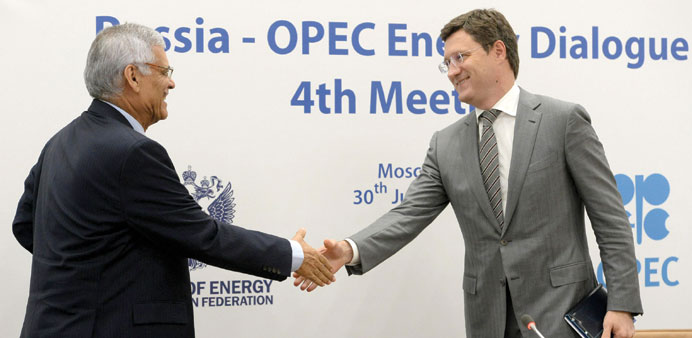Al-Badri and Novak shake hands during a press-conference after Russia-Opec energy dialogue meeting in Moscow yesterday. Oil has dropped about 15% this month and halved in value in the past year but neither Opec nor Russia, the world’s top producer, have cut output to support prices, hoping cheaper oil will hit US shale and other rival sources.
Reuters/Moscow
Opec expects increasing oil demand to prevent a further fall in prices and sees a more balanced market in 2016, its secretary-general said yesterday, the latest sign the group is sticking to its policy of defending market share.
Oil has dropped about 15% this month and halved in value in the past year but neither Opec nor Russia, the world’s top producer, have cut output to support prices, hoping cheaper oil will hit US shale and other rival sources.
“I would not expect they (prices) are going to fall because demand is growing,” Opec Secretary-General Abdullah al-Badri told reporters in Moscow. Opec pumps around 40% of global oil production.
“The current situation is a test for all producers and investors. While the prices ... no doubt will rebound, it is still too early to say when this will happen,” al-Badri said. He did not indicate what price he expected.
Opec faces a further challenge from the prospect of rising output from Iran, which has been lobbying for other Opec members to curb supply to make way for a hoped-for rise in its exports following Tehran’s deal with world powers over its nuclear work.
But al-Badri, indicating confidence in the outlook, was quoted by Russia’s Interfax news agency as saying the market could accommodate extra oil from Iran as demand increased - echoing the view of Gulf Opec members.
Russian Energy Minister Alexander Novak, who met with al-Badri earlier in the day, said they did not discuss co-ordination to help the market rebound.
Al-Badri added that even if Opec had cut output by as much as 2mn bpd - equal to around half of Russian exports - it would not have helped prices.
Novak said earlier that an oil price of between $50 and $65 per barrel - compared to the current level of around $54 - was “expected”. He estimated that global oil demand would grow by 1.2-1.3mn bpd this year.
While some Opec delegates have expressed concern over the recent fall in prices, al-Badri said he had received no request for an extraordinary Opec meeting before the next scheduled gathering in December - which Russia would be ready to attend if invited.
Russia and Opec have a history of bumpy relations, with the group having urged Moscow a number of times to join in a market-boosting supply cut. Moscow has never fully cooperated and refused to do so as recently as June.
So far, Russia has withstood low prices, maintaining oil output at a post-Soviet high of 10.71mn bpd as a weak rouble offsets some of its losses.
Saudi Arabia, the world’s top oil exporter and largest producer in Opec with one of the world’s lowest costs, ramped up its crude production to a record in June.
“Russian majors’ upstream cash flow break-evens are among the lowest in the world at less than $60 per barrel. Costs are largely rouble-denominated and among the lowest in the world,” Valentina Kretzschmar, a research director for Wood Mackenzie, said in a recent report.
In a joint statement, Russia and Opec said they saw the possibility for the market to become more balanced and stable next year - an Opec position based on expectations that China and the developing world will increase oil consumption.
“Despite current uncertainties, signs of a more balanced market in 2016 may provide much desired stability to the oil market in the longer-term,” the statement said.
Novak said in a statement: “We, Russia and Opec members, being responsible participants on the global oil market, should conduct our policy based on the full ... understanding of its (global oil market) key factors and characteristics. Here we are pursuing the common goals of keeping the market in a balanced and stable state.”
‘Oil prices set to recover, but oversupply will cap gains’
Oil prices are likely to bounce back from six-month lows to end this year higher and climb further in 2016 thanks to rising demand from emerging markets, a monthly Reuters poll showed yesterday.
But the survey of 30 industry and bank analysts said a global supply glut and strong dollar should cap price gains and keep fuel costs well below recent averages over the next couple of years. “Prices are at unsustainable lows after an exaggerated selloff,” said Carsten Fritsch, analyst at Commerzbank in Frankfurt.
Benchmark Brent hit a low of $52.28 a barrel on Tuesday, its cheapest since February 2 as an oversupply of crude and the rising dollar combined with worries over China, the world’s biggest energy consumer.
Saudi Arabia is pumping record volumes of crude oil as it battles for market share, and analysts say the Organisation of the Petroleum Exporting Countries is now producing around 3mn bpd more than required.
But prices have fallen to below break-even levels for some oil producers, including a number of shale companies in the US, and analysts say this should help prices recover.
The Reuters survey forecast Brent would average $60.60 a barrel in 2015 and $69 in 2016, compared with an average so far this year of around $59 and just under $100 in 2014.
The poll forecast US light crude would average $54.90 a barrel in 2015 and $63.80 in 2016, up from an average of $53 in the year to date.
Eleven analysts who had contributed to the June oil poll cut their 2015 Brent outlook in the latest survey, while 15 kept forecasts unchanged. Fifteen analysts forecast Brent above $60.90, compared with 16 in last month’s poll.

